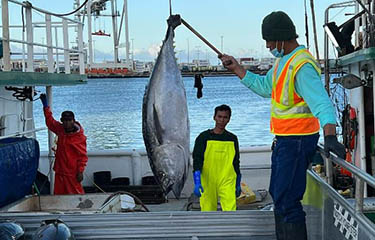If U.S. lawmakers have their way, foreign laborers would be able to fly directly to Hawaii to participate in the longline tuna industry instead of boarding vessels in American Samoa or Mexico.
Since 2004, the roughly 700 foreign laborers who work in Hawaii’s longline tuna fishery have existed in a legal loophole. While the workers are allowed to live and work on the longline vessels, they are ineligible for visas and are technically barred entry to the U.S. When the vessels come into port, the foreign workers are confined to the pier area.
This also means that these workers are unable to fly to Hawaii and board the vessels there. Instead, vessel operators must make the potentially dangerous journey to American Samoa or Mexico to pick up foreign laborers. Each trip can take weeks and cost operators as much as USD 10,000 to 15,000 (EUR 9,000 to 13,600), according to a 2019 report from the Georgetown Law Human Rights Institute.
In the past, this has led to dangerous practices, such as overloading vessels beyond their passenger capacity to make the journey, or fishermen jumping into the ocean from their boats and swimming over to tuna vessels for work, the report claimed. The difficulty of getting to the Hawaiian vessels incentivizes foreign workers to accept longer contracts and go for extended periods without visiting home or their families.
“What [the fishermen] really want is to be able to work for 11 months and go home for one month, then come back,” one anonymous stakeholder told the Georgetown Law Human Rights Institute. “The way things are right now with the regulations, they cannot do that. They have to stay, so they stay like two years. So, [then] they go home and they’re done. Or if they get deported, they’re done. Which is not really [in] anybody’s interest. If you talk to vessel owners here, they’ll say, ‘We wish they could go home for a month and come back again easily without triggering this whole thing.’”
Now, U.S. senators are asking U.S. Customs and Border Protection to consider creating a new permit that would allow these foreign workers to fly directly to Hawaii. Lawmakers on the Senate Appropriations Committee included the provision in the annual Homeland Security funding bill, which the committee passed 27 July.
“The committee is aware of the workforce requirements and challenges that are unique to the federally managed longline fishing fleet based out of Hawaii and the impacts that are the result of denying U.S. vessel owners and operators the ability to facilitate the employment of foreign crewmen through commercial air travel,” the senators said in the report. “The committee directs CBP to assess options for a limited or temporary use of authority to allow for the entry of designated crewman via air travel and transfer to their place of employment onboard Hawaii-based longline fishing vessels.”
The provision is not part of the House version of the bill, which the House Appropriations Committee approved in June.
Labor advocates and industry representatives have called on the government to remedy the situation.
A bill that would have allowed foreign fishermen to come to shore was introduced in 2017, but never received a hearing.
The Hawaii Longline Association has advocated for the creation of a temporary visa program for foreign fishing crews.
“Providing foreign crews temporary work visas, as recommended in the Task Force report, is an important measure that would benefit foreign workers in our fishery, allowing them to go home and visit family and friends and then return to Hawaii via air travel in an efficient, humane manner,” HLA Executive Director Eric Kingma said in 2021.
Photo courtesy of Dogan Volkan Korpi/Shutterstock







